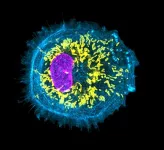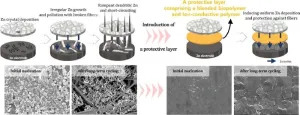An international team of scientists has uncovered the vital role of microglia, the immune cells in the brain that acts as its dedicated defense team, in early human brain development. By incorporating microglia into lab-grown brain organoids, scientists were able mimic the complex environment within the developing human brain to understand how microglia influence brain cell growth and development. This research represents a significant leap forward in the development of human brain organoids and has the potential to significantly impact our understanding of brain development and disorders. The study, “iPS-cell-derived microglia promote brain organoid maturation via cholesterol transfer” was published in Nature on 1 November 2023.
To investigate microglia's crucial role in early human brain development, scientists from A*STAR's Singapore Immunology Network (SIgN) led by Professor Florent Ginhoux, utilised cutting-edge technology to create brain-like structures called organoids, also known as “mini-brains” in the laboratory. These brain organoids closely resemble the development of the human brain. However, previous models were lacking in microglia, a key component of early brain development.
To bridge this gap, A*STAR researchers designed a unique protocol to introduce microglia-like cells generated from the same human stem cells used to create the brain organoids. These introduced cells not only behaved like real microglia but also influenced the development of other brain cells within the organoids.
A*STAR's Institute of Molecular and Cell Biology (IMCB)'s Dr Radoslaw Sobota and his team at the SingMass National Laboratory for Mass Spectrometry applied cutting edge quantitative proteomics approach to uncover changes in protein. Their analysis provided crucial insights into the protein composition of the organoids, further confirming the study’s findings.
What sets this study apart is the discovery of a unique pathway through which microglia interact with other brain cells. The study found that microglia play a crucial role in regulating cholesterol levels in the brain.The microglia-like cells were found to contain lipid droplets containing cholesterol, which were released and taken up by other developing brain cells in the organoids. This cholesterol exchange was shown to significantly enhance the growth and development of these brain cells, especially their progenitors.
Cholesterol, makes up about 25% of the body's total cholesterol content, is abundantly present in the brain and is essential for the structure and function of neurons. Abnormal cholesterol metabolism has been linked to various neurological disorders, including Alzheimer's and Parkinson's Disease.
To investigate the roles of lipids in brain development and disease, researchers from the Department of Biochemistry at the Yong Loo Lin School of Medicine (NUS Medicine), led by Professor Markus Wenk, took on the crucial task of data acquisition, particularly in the field of lipidomics to draw valuable insights into the lipid composition and dynamics within the brain organoids containing microglia.
Using this information, another team from the Department of Microbiology and Immunology at NUS Medicine and led by Associate Professor Veronique Angeli, found that cholesterol affects the growth and development of young brain cells in human brain models. Microglia use a specific protein to release cholesterol, and when this process is blocked, it causes the organoid cells to grow more, leading to larger brain models. “It has always been known that the microglia is key to brain development, however their precise role remains poorly understood. This finding from our team at the Department of Microbiology and Immunology is particularly impactful because we finally understand how cholesterol is transported. Our next focus will be finding out how we can regulate cholesterol release to optimise brain development and slow down, or prevent, the onset of neurological conditions,” added Assoc Prof Veronique, who is also Director of the Immunology Translational Research Programme at NUS Medicine.
Moreover, Dr Olivier Cexus from the University of Surrey and formely at A*STAR, progressively deciphered the complex molecular interactions within the brain organoids using proteomic and lipidomic analysis. This provided valuable insights into the metabolic cross-talks involved in brain development and potential implications for diseases.
Together, these collective efforts were instrumental in deepening our understanding of the roles of microglia and the molecular components within brain organoids and its implications for human health.
Prof Florent Ginhoux, Senior Principal Investigator at A*STAR’s SIgN and Senior author of the study said, "Understanding the complex roles of microglia in brain development and function is an active area of research. Our findings not only advance our understanding of human brain development but also have the potential to impact our knowledge of brain disorders. This opens up new possibilities for future research into neurodevelopmental conditions and potential therapies."
Co-author of the study, Professor Jerry Chan, Senior Consultant, Department of Reproductive Medicine, KK Women’s and Children’s Hospital, and Senior National Medical Research Council Clinician Scientist, added, “There is currently a lack of tools to study how microglia interacts with the developing brain. This has hampered the understanding of microglia-associated diseases that play an important role during the early development of conditions such as autism, schizophrenia, and neurodegenerative diseases such as Alzheimer’s and Parkinson’s disease.
“The development of these novel microglia-associated brain organoids with same-donor pluripotent stem cells gives us an opportunity to study the complex interactions between microglia and neurons during early brain development. Consequentially, this may enable us to study the role of microglia in the setting of diseases and suggest ways to develop new therapies in time.”
END



